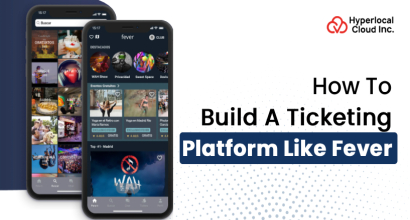In an age where users interact with apps and websites across multiple devices, providing them with instant services is crucial yet increasingly complex for businesses.
A property management app is a powerful tool that can revolutionize your business. It tracks customer behavior and provides AI-powered actionable insights that can drive your business forward.
As a fruitful vision for those aiming to take their business online, the property management app provides crucial and detailed insights into how users interact with your digital services.
It significantly improves the conventional real estate business approach, making developing a property management app an essential execution approach.
Step onto the digital landscape with our white-label property management software, which will take your business to the next level. Let Hyperlocal Cloud's maestros be your development ally! Contact us now.
This blog post explains the basics of developing a property management app and how it can benefit your real estate business. Let's dive right in!
Benefits of Developing a Property Management App
The global property management app market size can grow at a CAGR of 8.9% from 2024 to 2030. A property management app has several benefits that improve efficiency in managing different properties. Below are some key perks:
Streamlined Operations: The property management app covers eminent property-related tasks, such as rent collection, maintenance requests, lease management, and tenant communication. It simplifies operations and diminishes the need for manual procedures.
Enhanced Communication: Introduce your business to a platform that streamlines accessible communication between property managers, owners, and tenants! It features maintenance request notifications, automated reminders, and lease renewal updates.
Improved Tenant Management: Get everything done with clicks! Property management apps are crucial for maintenance requests and rent payments, enhancing tenants' satisfaction and convenience. This results in enhanced tenant retention rates and reduced vacancies.
Financial Management: The software incorporates traits, such as financial report creation, rental payment tracking, and budget management. It enhances transparency and ensures financial accuracy.
Maintenance Management: The app administers ongoing property system tasks, schedules repairs, and tracks tenant maintenance requests. With this proactive approach, you can ensure well-maintained properties.
Document Management: Creating a property management app leads to a flawless document storage process. From inspection reports and digital storage of lease agreements to other imperative documents, it diminishes paperwork, making it easier to access required information.
Scalability: Get ready to scale your business needs with an accumulatively featured property management app that accommodates more properties and enhances your portfolio.
Compliance and Legal Support: Platforms help property managers comply with local laws and regulations. They emphasize automated rent increase notifications and lease renewal reminders.
Data Insights: Switching to a property management app allows you to leverage valuable insights through reporting and analytics. This data helps property managers decide on marketing strategies, pricing, and enhancements.
Remote Access: The cloud-based property management app allows access from anywhere with a powerful internet connection, letting property managers manage and monitor properties remotely and securely.
Build Your Own Property Management App
Setting Up Property Management App
With its advanced features and enhanced automation capabilities, the property management app offers a comprehensive solution for monitoring every property handling task and optimizing your digital presence. Below is how to set up a property management app-
Step 1: Decide on the Property Management App Type You Need
Property management app caters to your business needs, so you must convey your thoughts on the type of app you need. Let's discuss here-
Residential property management app: It aims at house and flat owners who want to manage a tenant database and track payments and occupancy.
Commercial Property Management app: This platform bolsters retail amenities and business premises owners who want to control their business activities, such as accounting, maintenance, marketing, etc.
Industrial property management app: This indispensable tool targets manufacturers, allowing them to oversee administration and diminish employees' workloads.
Hotel Management App: This app supports daily activities and unifies accounting, tracking, and CRM. It controls other modules that help check guests in and out, track room status, and verify payments.
Homeowners Association App: These tools assist homeowners associations in handling operations, streamlining reporting, payments, accounting, and initial screening of residents, and automating routine tasks.
Choosing the type of property management app that fits your business goals helps you define the features and functionalities you want to add to your app.
Step 2: Determine the App's Core Features and Functionality
A property management app relies on the following functions and features you would prefer to add to yours.
Lease Tracking and Tenant Screening: Expand the standard functionality of the CRM systems to keep everything on record. The app tracks everything throughout the process, from assisting tenants with queries to screening them and selling property to putting it on sale.
Online Payment for Rent Collection: Renters can communicate with homeowners and pay rent on time, saving the payment as a record for their monthly payment. Property managers can also send rent reminders or create notifications.
Accounting: Landlords and property managers manage finances and receive reporting and analytics for leased and sold properties. They can track their real estate investments and decide if they are worth it.
Virtual Tours: The software enriches the functionality of virtual tours. It takes users through the property virtually, helping them get acquainted with the real estate. It engages users and helps them make further decisions.
Contract Management: Agents and brokers manage contracts and apply digital signatures on the property management app. It helps them create digital agreements online and check upon matchmaking algorithms in real estate solutions.
Maintenance: The app allows users to streamline and control maintenance processes and the time spent on each. It boosts real estate business workflow and strategies.
Reporting: It includes analytical tools and other solutions to administrate expenses and incomes, object availability, and other business prospects. The reports must be available for download in a convenient format.
Communication: The property management app is easy to access and manage. It is a one-stop solution that allows you to contact renters or buyers through the system and store chats.
Guarding: The platform performs guard patrolling functions and real-time monitoring, including GPS tracking, to develop visible routes for patrol guards.
Step 3: Find a Reliable App Development Company
After you have a clear vision of which property management app and features you require, opt for a reliable company that can bring your vision to life. When choosing app development experts, screen their previous experience, project portfolio, and client reviews. Also, check the services they provide in their development process.
Step 4: Pick a Suitable Way to Build a Property Management App
Learn about different property management approaches in the real estate sector. Your app development ally can help you with this. The first option anticipates picking a steadfast SaaS solution, and the second is developing a custom app. SaaS fits perfectly with startup real estate businesses, while a custom property management app suits all due to the following benefits-
- Proficiency in implementing any tools you require and maintaining them hassle-free.
- Automation abilities reduce manual work.
- Tenants and homeowners can avail of custom features, such as integration with shipping, 3D tours, or other services.
- An implanted rating system and communication tools
- High level of security
Step 5: Act Upon Crucial Details
While you bet on your property management solution's future success and growth, consider scalability through the user interface, core functionality, and application layer. Moreover, property management apps are gaining popularity due to their high availability, enhanced security, and flexibility.
Take the first step towards creating your property management app!
Streamline Property Sales and Lease with These Must-Have Features
Expanding your real estate business needs an amicable platform that effortlessly handles every property management task. Developing a property management app with top-notch features helps you reach a large audience. By embracing the following features, you can provide customers with a seamless real estate experience no matter where they are.
User Panel (Buyers/Tenants/Landlords)
User Registration: Sign up for their account or create new accounts through email ID or mobile number.
Profile Verification: Whether a broker or tenant, the app features profile verification through a secret code sent to a registered number. It also asks for ID proofs, location, property type, and contact details.
Search Property: It is worth keeping search filters on the home page, as users often land there to search for a property.
User Search Filters: The app allows users to apply filters such as budget, area, budget, lease or buy, and more.
Property Description: Users must ensure their listed properties are detailed and descriptive. It helps them make quick decisions about the property.
Image Addition: Landlords should list their properties with HD-quality pictures from the required angles to provide a clear picture of their properties.
In-app Call/Chat: The app lets users directly contact property owners, helping them convert potential queries into leads.
Multi-Language Support: Apps allowing listing properties from different cities must support the local languages of those particular locations.
Admin Panel
Users Management: Admins can control multiple sellers, buyers, agents, and users, track and monitor user activities, and streamline the property management process.
Payment Records Track: Admins can closely analyze, track, and maintain the record of payment transactions.
Property Deals Management: Admins can launch property discounts, deals, or special offers depending on users' changing requirements and market fluctuations.
Property Management App Development Cost
Convenience is non-negotiable. Your chosen features should integrate effortlessly with your app. Real estate apps are known for their robust compatibility and demand expenses accordingly. Thus, considering the features or platforms your app needs, such as real-time analytics or property search filters, is essential.
A property management app development costs range from $10k to $50k. They depend on the features, functionalities, platforms, and other factors you want to include. Property management app development stands out for its straightforward fees, broad convenience, and exceptional user experience. Ensure your final decision aligns with your online business's requirements and goals.
Final Words
Property management app development is not just a technical detail—it's a cornerstone of a successful real estate business that directly affects your reputation and deliverability. Mastering digital presence ensures your marketing messages reach your audience securely and reliably.
Developing a property management app involves managing everything on one portal. You need professional assistance like Hyperlocal Cloud to create and launch your app on the market. Contact us now!



